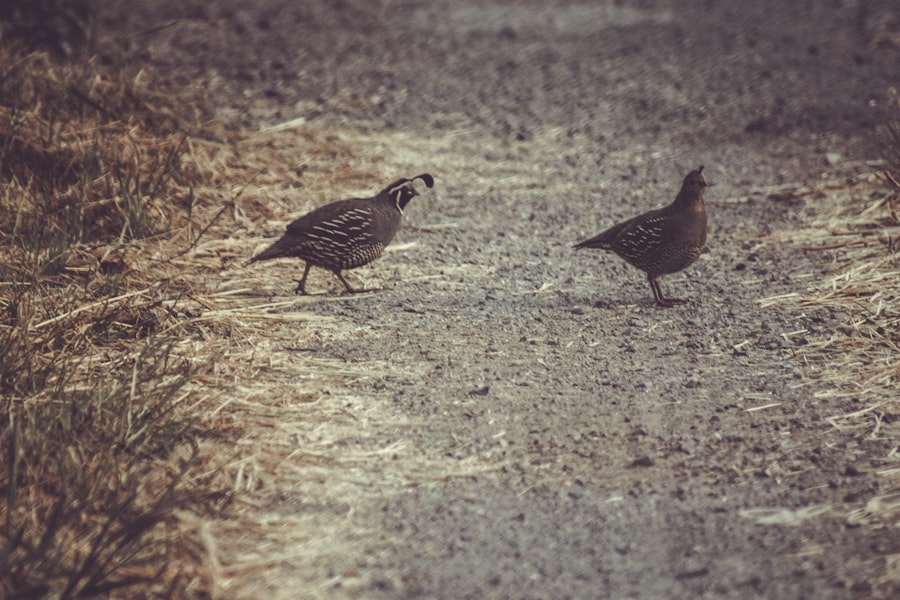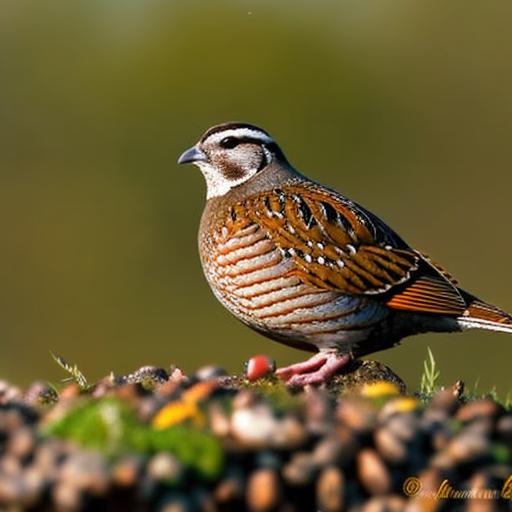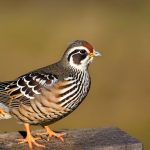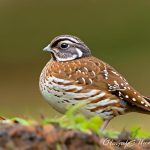Quail keeping is a rewarding and enjoyable hobby that has been gaining popularity in recent years. Quails are small, ground-dwelling birds that are known for their delicious eggs and meat. They are relatively easy to care for and can be kept in a backyard or on a small farm. Quails come in a variety of species, each with its own unique characteristics and requirements. Whether you are interested in raising quails for their eggs, meat, or simply as pets, there are a few key factors to consider when getting started with quail keeping. This article will provide a comprehensive guide to quail keeping, including choosing the right quail species, setting up a quail habitat, feeding and nutrition, health and care, breeding and incubating quail eggs, and tips for successful quail keeping.
Key Takeaways
- Quail keeping is a rewarding hobby that requires proper knowledge and care to ensure the well-being of the birds.
- When choosing the right quail species, consider factors such as space, climate, and intended use (meat, eggs, or pets).
- Setting up a quail habitat involves providing adequate space, shelter, and protection from predators.
- Feeding and nutrition for quail should include a balanced diet of commercial feed, fresh water, and occasional treats.
- Health and care for quail involves regular monitoring for signs of illness, providing a clean environment, and seeking veterinary care when needed.
- Breeding and incubating quail eggs requires proper nesting boxes, temperature control, and regular turning of the eggs.
- Tips for successful quail keeping include proper socialization, handling with care, and providing enrichment activities for the birds.
Choosing the Right Quail Species
When it comes to choosing the right quail species for your needs, there are several factors to consider. Some of the most popular quail species for keeping include the Coturnix quail, Bobwhite quail, and California quail. Coturnix quail, also known as Japanese quail, are the most commonly raised species for their eggs and meat. They are relatively small in size, easy to care for, and are known for their high egg production. Bobwhite quail are native to North America and are popular for hunting and as pets. They are larger in size compared to Coturnix quail and have a distinctive white throat and eye stripe. California quail are known for their striking appearance with a curved black head plume and chestnut brown belly. They are popular for their beauty and are often kept for ornamental purposes.
When choosing the right quail species, it is important to consider your specific goals for quail keeping. If you are primarily interested in egg production, Coturnix quail may be the best choice due to their high egg-laying capacity. If you are looking for quails with striking appearances, California quail may be the ideal choice. Additionally, it is important to consider the climate and habitat in which you will be keeping the quails, as different species have varying temperature and environmental requirements. By carefully considering these factors, you can choose the right quail species that best suits your needs and preferences.
Setting Up a Quail Habitat
Setting up a suitable habitat is essential for the health and well-being of your quails. Quails require a secure and spacious enclosure that provides protection from predators and the elements. The size of the enclosure will depend on the number of quails you plan to keep, but as a general rule of thumb, each quail should have at least 1 square foot of space. The enclosure should be constructed with sturdy materials such as wire mesh or wood to prevent escape and protect the quails from predators. It is also important to provide adequate ventilation to prevent the buildup of ammonia from their droppings.
In addition to a secure enclosure, quails also require a suitable nesting area where they can lay their eggs in privacy. This can be achieved by providing nesting boxes or shelters within the enclosure. The nesting area should be filled with soft bedding material such as straw or wood shavings to provide a comfortable and safe environment for the quails to lay their eggs. Furthermore, it is important to provide a suitable substrate for the quails to scratch and dust bathe, as this is a natural behavior that helps them maintain healthy feathers and skin. By setting up a well-designed habitat that meets the specific needs of your chosen quail species, you can ensure that your quails thrive in their new environment.
Feeding and Nutrition for Quail
Proper nutrition is essential for the health and productivity of your quails. Quails are omnivorous birds that require a balanced diet consisting of protein, carbohydrates, vitamins, and minerals. A commercial game bird feed formulated specifically for quails is an ideal option as it provides the essential nutrients they need for growth and egg production. Additionally, offering supplemental treats such as mealworms, fruits, and vegetables can provide enrichment and variety in their diet.
It is important to provide access to clean water at all times, as quails have high water requirements, especially during egg production. Water should be provided in shallow dishes or waterers that are easily accessible to the quails. Furthermore, it is important to monitor their food intake and adjust feeding amounts based on their age, activity level, and environmental conditions. Providing proper nutrition is crucial for preventing health issues and ensuring that your quails are able to reach their full potential in terms of egg production and overall well-being.
Health and Care for Quail
Maintaining the health of your quails is essential for their longevity and productivity. Regular observation of your quails is important to monitor their behavior and identify any signs of illness or injury. Common health issues in quails include respiratory infections, parasites, and nutritional deficiencies. It is important to provide a clean and dry environment to prevent the buildup of bacteria and parasites that can lead to health problems.
In addition to maintaining a clean environment, it is important to practice good biosecurity measures to prevent the introduction of diseases into your quail flock. This includes quarantining new birds before introducing them to your existing flock, as well as limiting exposure to wild birds and other potential sources of disease. If you notice any signs of illness in your quails, it is important to seek veterinary care from a professional with experience in avian medicine.
Regular grooming and maintenance are also important aspects of caring for your quails. This includes trimming their nails if they become overgrown, checking for signs of external parasites such as mites or lice, and providing dust bathing areas to help them maintain healthy feathers and skin. By providing proper care and attention to the health needs of your quails, you can help ensure that they lead long and healthy lives.
Breeding and Incubating Quail Eggs

Breeding quails can be a rewarding experience that allows you to expand your flock and potentially increase egg production. When breeding quails, it is important to provide a suitable environment that encourages natural mating behavior. This includes providing adequate space within the enclosure, as well as ensuring a balanced male-to-female ratio to prevent aggression among males.
Once the eggs have been laid, they can be collected and placed in an incubator to hatch. Quail eggs typically have an incubation period of around 17-18 days before they hatch into chicks. It is important to carefully monitor temperature and humidity levels within the incubator to ensure optimal conditions for embryo development. Turning the eggs several times a day during the incubation period is also important to prevent the embryo from sticking to the shell membrane.
After hatching, the chicks will require a warm brooder area with access to food and water to support their growth and development. Providing a suitable brooder environment with proper heat lamps or heating pads is essential for ensuring the health and well-being of the chicks. By following proper breeding and incubation practices, you can successfully expand your quail flock and enjoy the experience of raising new generations of quails.
Tips for Successful Quail Keeping
Successfully keeping quails requires attention to detail and a commitment to providing proper care for these unique birds. Here are some additional tips to help ensure success in your quail keeping endeavors:
– Provide ample space: Quails require plenty of space to move around and exhibit natural behaviors such as scratching and dust bathing.
– Monitor egg production: Keep track of egg production from each individual bird to identify any changes in laying patterns or potential health issues.
– Prevent overcrowding: Overcrowding can lead to stress, aggression, and reduced egg production among your quails.
– Practice good hygiene: Regularly clean the enclosure and nesting areas to prevent the buildup of bacteria and parasites.
– Monitor behavior: Pay attention to the behavior of your quails to identify any signs of illness or distress.
– Seek veterinary care: If you notice any signs of illness or injury in your quails, seek veterinary care from a professional with experience in avian medicine.
– Provide enrichment: Offer environmental enrichment such as perches, hiding spots, and toys to keep your quails mentally stimulated.
– Join a community: Consider joining online forums or local groups dedicated to quail keeping to connect with other enthusiasts and gain valuable insights.
By following these tips and guidelines, you can create a thriving environment for your quails and enjoy the many benefits of keeping these fascinating birds.
In conclusion, quail keeping is a fulfilling hobby that offers numerous rewards for those who are willing to invest time and effort into caring for these unique birds. By choosing the right quail species, setting up a suitable habitat, providing proper nutrition and care, breeding and incubating eggs, and following best practices for successful quail keeping, you can create a thriving environment for your quails to flourish. Whether you are interested in raising quails for their eggs, meat, or simply as pets, the experience of caring for these charming birds is sure to bring joy and satisfaction to any enthusiast.
If you’re interested in quail keeping, you might also want to check out Poultry Wizard’s article on “How Big Does a Coop Need to Be for a Chicken?” This informative piece provides valuable insights into the space requirements for chicken coops, which can be helpful when designing a suitable habitat for your quails as well. Understanding the coop size needed for chickens can offer valuable guidance for creating an optimal living environment for your quail flock. (source)
FAQs
What is quail keeping?
Quail keeping refers to the practice of raising and caring for quail, a type of small game bird, typically for the purpose of producing eggs or meat.
What do quails eat?
Quails are omnivorous birds and their diet typically consists of a combination of seeds, grains, insects, and small invertebrates. Commercially available quail feed is also commonly used.
What type of housing do quails need?
Quails require a secure and well-ventilated housing structure that protects them from predators and the elements. This can include a coop or aviary with appropriate bedding and nesting areas.
How do you care for quails?
Caring for quails involves providing them with a balanced diet, clean water, suitable housing, and regular health checks. It’s also important to ensure they have enough space to move around and engage in natural behaviors.
What are the benefits of quail keeping?
Quail keeping can provide a sustainable source of eggs and meat, as well as the opportunity to observe and appreciate these unique birds. Additionally, quails are relatively low maintenance compared to other livestock.
Are there any legal considerations for keeping quails?
Laws and regulations regarding the keeping of quails vary by location, so it’s important to research and comply with any relevant permits, zoning restrictions, and animal welfare standards.
Meet Walter, the feathered-friend fanatic of Florida! Nestled in the sunshine state, Walter struts through life with his feathered companions, clucking his way to happiness. With a coop that’s fancier than a five-star hotel, he’s the Don Juan of the chicken world. When he’s not teaching his hens to do the cha-cha, you’ll find him in a heated debate with his prized rooster, Sir Clucks-a-Lot. Walter’s poultry passion is no yolk; he’s the sunny-side-up guy you never knew you needed in your flock of friends!







